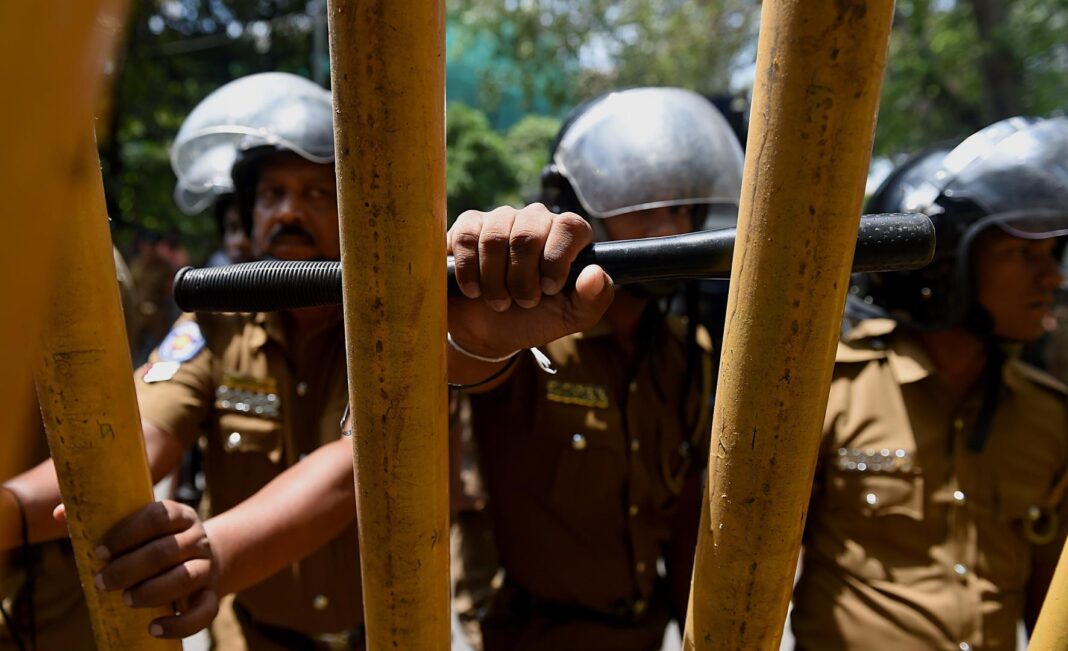Image courtesy of HRW.
This commentary examines in brief, proposed amendments for the Prevention of Terrorism (Temporary Provisions) Act (PTA) which were approved by Cabinet on 24 January 2022 and subsequently gazetted. The Centre for Policy Alternatives (CPA) has prepared this document as an initial comment to the proposed amendments with further advocacy to follow after the tabling of the bill in Parliament.
At the outset CPA notes that the proposed amendments follow a minimalist approach, introducing only basic reforms which are insufficient to address ground realities. Many of the aspects which require urgent reform as highlighted by legal scholars, civil society actors and even the Supreme Court of Sri Lanka have not been addressed in the Bill.
In this light, the proposed amendment to the PTA appears to be more a token effort to address international pressure rather than a genuine and effective exercise to address ground realities and the abuses and violations brought about by the PTA.
The present document raises several of these concerns with CPA reiterating its previous call for the repeal of the PTA. Further, while reiterating CPA’s earlier concerns and the need for new legislation upon the repeal of the PTA, CPA calls for an immediate moratorium on the use of PTA until an acceptable law can be drafted.
Several key concerns consistently raised by CPA and others and in the jurisprudence on the PTA have not been addressed in the amendments.
- The amending Bill does not address problems with the admissibility of statements and confessions under the PTA. The provisions of the PTA waive the application of the Evidence Ordinance and there are no safeguards to be followed in recording confessions and statements from suspects. This has been particularly pointed out as a matter for concern by the Supreme Court of Sri Lanka in Maridas v The State.
- The period of 72 hours after arrest and before production before a magistrate has not been amended. This is a loophole in the PTA which facilitates the torture of those arrested under the PTA while in custody.
- The lack of judicial oversight during investigations has not been addressed by the amendments. The extensive powers granted to investigating officers including to take suspects from place to place, creates space for the continued violation of their rights as many reported being subjected to torture during such periods of being taken out of prison for interrogation.
- The definition of the acts which fall within the offence of terrorism is of a broad and vague nature, and has allowed the PTA to be used even in instances where its use is not warranted. This has not been addressed by the amendments.
- The access to an attorney-at-law is already provided for by law and the amending provision does not ensure the protection of the right to representation of the accused. Many PTA prisoners mention difficulties, particularly financial difficulties they face retaining legal counsel, as well as due to the nature of the cases, since there is stigma attached to appearing for a PTA accused. The amendments fail to address this issue.
- There is no provision in the PTA for information to be provided at the time of arrest on the cause of arrest and the rights of the suspect. This is in violation of Article 13(1) of the Constitution and Sri Lanka’s international obligation under Article 9(2) of the ICCPR.
- The PTA gives broad rule making powers to the minister and this has led to several instances where regulations which enable abuse and human rights violations have been made under these provisions. Most recently, the Prevention of Terrorism (De-radicalization from holding violent extremist religious ideology) Regulations No. 01 of 2021 which can further jeopardise the rights and liberties of persons, especially religious and ethnic minorities, and curtail political dissent with no effective due process guarantees has been promulgated under this provision. The amendment fails to address this.
- Section 6 of the PTA gives extensive powers of search and seizure. The implementation of these powers should be carried out in a manner consistent with the inherent dignity of the person and international human rights law. The implementation of these measures relating to search and seizure should be professional and transparent and subject to oversight and judicial scrutiny. The amendment fails to address this.
The present document consists of two parts. Part I, will provide a brief initial comment on the impact of the proposed amendments to the PTA. CPA concludes that the proposed amendments are grossly inadequate and represent an absolute minimalist approach, introducing only basic reforms which are insufficient to address ground realities. In this light, the proposed amendment to the PTA appears to be more a token effort to address international pressure rather than a genuine and effective exercise to address ground realities and the abuses and violations brought about by the PTA.
Part II will give a brief overview of the historic criticism of the PTA, including pronouncements made by the Supreme Court of Sri Lanka questioning the constitutional legitimacy of the law.
Read the full document as a PDF:CPA_ Final-PTA-Amendment-2022 January
Press Release/31st January, 2022, Colombo, Sri Lanka:
Prevention of Terrorism (Temporary Provisions) (Amendment) Bill is here: PTA Amendment gazette 270122 171-2022_E
